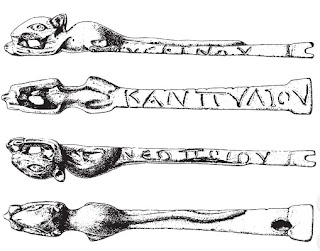 This
week in the peerless Aeon magazine there is a fine philosophical essay
by Neil Levy on Virtue Signalling. This form of behaviour, in its true form,
consists of one individual rebuking another for not being virtuous enough in
choice of language, often online. The objective is to display the rebuker’s
superior virtue.
This
week in the peerless Aeon magazine there is a fine philosophical essay
by Neil Levy on Virtue Signalling. This form of behaviour, in its true form,
consists of one individual rebuking another for not being virtuous enough in
choice of language, often online. The objective is to display the rebuker’s
superior virtue.  |
| Helmeted VIRTUS of Aquillius |
Virtue
Signals are usually distinguishable from genuine moral interventions springing
from altruistic motives. But it would be helpful to have a meme, or a costume
to wear, when we’re Virtue Signalling ourselves. I’ve gone to the original and
literal Virtue Signals in ancient Rome to find examples.
Mn.
Aquillius in 65 BCE issued a coin celebrating his ancestor’s imperial savagery
in Sicily which claimed it was due to his VIRTUS. She is helpfully
name-labelled but identifiable from her ringlets and elaborate helmet with an
olive sprig. Olive was PR-speak for a statesman’s
Achievement-of-Peace-through-Brutal-Suppression-of-Opposition, which in the
game of Roman spin could also be abbreviated to VIRTUS.
 |
| Septimius Severus' VIRTUS |
Sometimes
Virtue waves an olive twig. She sometimes holds a statuette of another
personification, Victory. She often brandishes a spear and leans on a shield.
But her most distinctive accoutrement is a parazonium or long, phallic
triangular dagger, held at waist level.
 |
| Trajan's VIRTUS plus parazonium |
Sometimes
she puts her foot on her helmet or sits on a cuirass. Philip I went furthest
and simply has her as world-conqueror, one foot on a globe, her spear pointing
downwards because His Virtue Has Triumphed Everywhere.
 |
| Caracalla Poses as the Goddess VIRTUS |
Fortunately,
given the touchiness of the topic of gender identity today, Virtus (although
grammatically feminine) looks like a male Roman soldier, while sometimes
revealing one breast in Amazonian manner. But Virtus can be as masculine as
Mars or an Emperor himself. The humourless and amoral Caracalla began by
putting a girlish Virtus in ankle boots on the obverse of his portrait coins
but later cut to the chase and simply posed as Virtue himself.
 So
it’s up to you—your VIRTUS could be conveyed to your Twitter followers in an
instant with a snapshot of one of these images. If they don’t get the hint,
then simply build a temple to Virtus, as M. Claudius Marcellus did in 222 BCE
when a battle wasn’t going well. Or, like Augustus, get the Senate to award you
a shield screaming to your public that you are endowed with VIRTUE as
well as CLEMENCY, JUSTICE and PIETY. They added his right to put an oak wreath
over his front door. That should quickly close all opposition down.
So
it’s up to you—your VIRTUS could be conveyed to your Twitter followers in an
instant with a snapshot of one of these images. If they don’t get the hint,
then simply build a temple to Virtus, as M. Claudius Marcellus did in 222 BCE
when a battle wasn’t going well. Or, like Augustus, get the Senate to award you
a shield screaming to your public that you are endowed with VIRTUE as
well as CLEMENCY, JUSTICE and PIETY. They added his right to put an oak wreath
over his front door. That should quickly close all opposition down.

















































